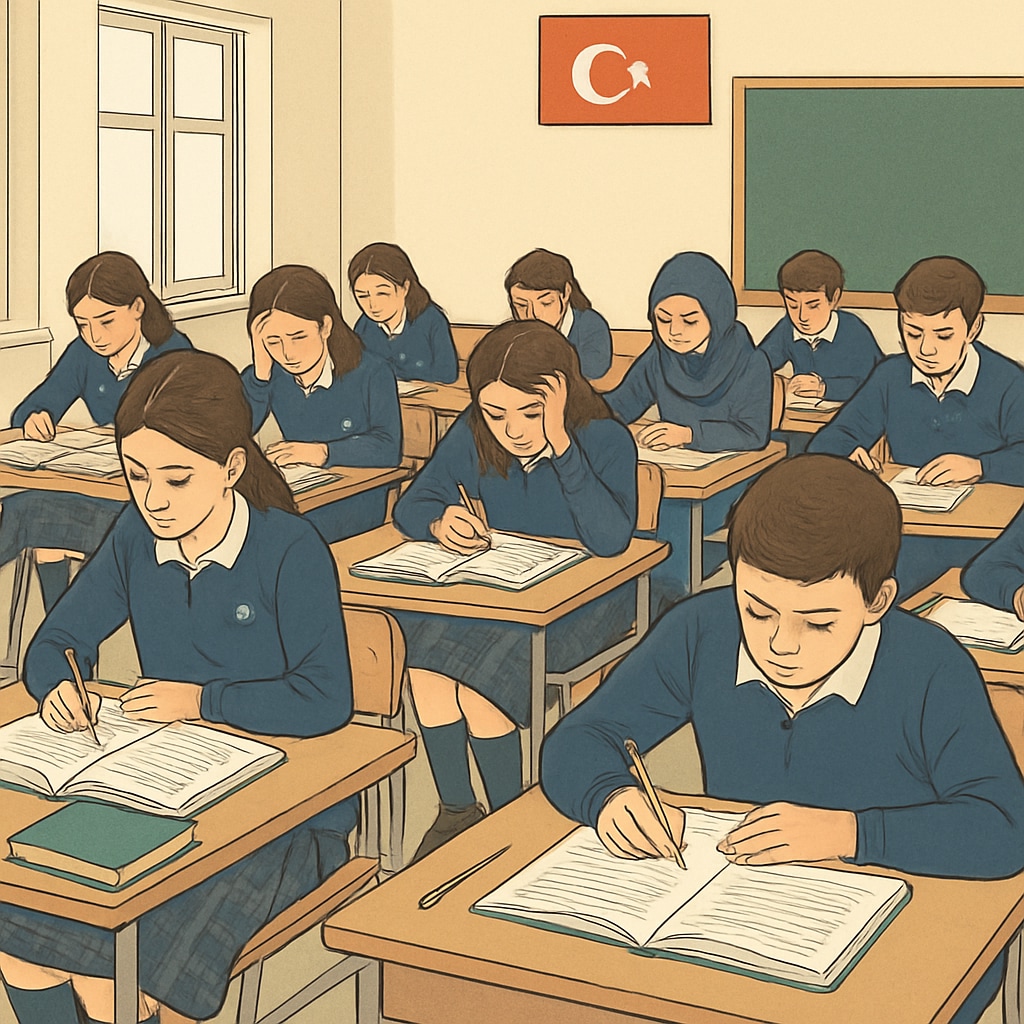Turkey’s education system is heavily reliant on centralized exams, creating an environment dominated by relentless exam pressure. This exam-centric approach significantly influences students’ academic and personal lives, often at the expense of creativity and critical thinking development. In contrast, the UK’s A Levels model offers a more flexible framework that nurtures analytical skills and individualized learning. This article examines the limitations of Turkey’s exam-driven model and discusses what lessons can be learned from the UK’s education system to inspire reform.
The Burden of Turkey’s Exam-Driven Education System
Turkey’s education system revolves around high-stakes standardized tests such as the “Yükseköğretim Kurumları Sınavı” (YKS), a university entrance exam. Success in these exams largely determines a student’s future academic and professional path. As a result, both students and teachers place disproportionate focus on rote memorization and test preparation, often sidelining broader intellectual and emotional development.
This model comes with several drawbacks:
- Stress and Anxiety: Students face immense psychological pressure to perform well, which can lead to burnout and mental health issues.
- Limited Skill Development: The emphasis on memorization leaves little room for fostering creativity, critical thinking, and problem-solving skills.
- Equity Concerns: Students from socioeconomically disadvantaged backgrounds often lack access to private tutoring, which is a common supplement to formal education in Turkey’s exam-centric system.
While this system may efficiently assess large numbers of students, it fails to recognize diverse talents and learning styles, creating a one-size-fits-all approach.

How A Levels Foster Critical Thinking and Flexibility
In stark contrast, the UK’s A Levels (Advanced Level qualifications) are designed to provide students with the autonomy to choose subjects that align with their interests and career aspirations. Typically, students focus on three or four subjects, allowing for in-depth exploration and mastery. This approach encourages analytical thinking, research skills, and intellectual curiosity.
Key advantages of the A Levels system include:
- Personalized Learning: Students can tailor their education to their strengths and career goals.
- Emphasis on Understanding: Assessment methods prioritize comprehension, critical analysis, and argumentation over rote memorization.
- Global Recognition: A Levels are internationally recognized, opening opportunities for students to pursue higher education worldwide.
By encouraging students to delve deeply into a select few subjects, the A Levels system cultivates a more profound understanding and prepares them for the intellectual demands of university life and beyond. Learn more about A Levels on Britannica.

What Turkey Can Learn from the UK’s A Levels Model
Turkey’s education system could benefit from adopting certain elements of the A Levels framework. While a complete overhaul may not be feasible, incremental changes could significantly improve the learning experience for Turkish students. Here are some potential reforms:
- Introduce Subject Flexibility: Allow students to specialize in areas of interest rather than covering a broad curriculum dictated by standardized exams.
- Shift Focus to Critical Thinking: Revise the exam structure to prioritize problem-solving and analytical skills over memorization.
- Provide Equal Access to Resources: Ensure all students, regardless of socioeconomic background, have access to quality education and support.
These adjustments could help Turkey strike a balance between assessing academic achievement and nurturing well-rounded, innovative thinkers.
Conclusion: A Call for Balanced Education
Turkey’s exam-driven education system, while efficient in certain aspects, places undue pressure on students and stifles creativity. By integrating elements of the UK’s A Levels approach, such as flexibility and an emphasis on critical thinking, Turkey can create a more balanced and innovative education system. Reforming the current model will not only benefit individual learners but also contribute to a more dynamic and forward-thinking society.
To learn more about global education systems, visit Education systems on Wikipedia.
Readability guidance: Short paragraphs and bullet points ensure clarity. Transition words like “however” and “therefore” improve flow. Active voice dominates the article to enhance engagement.


